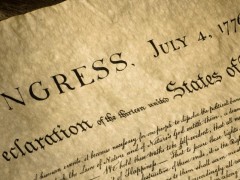How does Aquinas understand private property’s relationship to natural law? This question is a subset of the larger question of how human law in general relates to natural law in Aquinas’s thinking. This post takes up that question.
This is a continuation of my commentary on Thomas Aquinas’s views of private property in Article 2, Question 66 of Summa Theologiæ. ST II-II, 66, 2 [ST 2a2æ 66, 2]. The posts in sequence are: 1) Article 1 Text and Commentary 2) Article 2 Text and Prologue 3) Objection 1 to Private Property 4) On relationship of Natural Law and Human Law (this post) 5) Objection 2 to Private Property 6) Objection 3 to Private Property 7) Aquinas’s Views of Private Property 8) The First Human Competence: Care and Commerce 9) The Three Reasons Private Property is Necessary 10) The Second Human Competence 11) Reply to Objection 1: All Things in Common 12) Reply to Objection 2: Analogy of the Theater 12) Reply to Objection 3: Over consumption is robbery
As noted previously, Aquinas argues that private property is a reasonable extension of the natural law, even though the natural law indicates that everything was given in common. A key question, therefore, in the study of Aquinas’s theory of property is, “how does human law relate to natural law?” What kinds of human actions or laws are reasoned extensions to the natural law and which kinds are perversions of it? How does one know the difference?
The claim that private property is a reasoned extension to the natural law rather than a perversion of it raises some interesting questions about what is and is not perceived as aligned to nature.
For the present purposes, it is worth mentioning that Aquinas conceptually distinguishes three types of law: divine (or eternal) law, natural law, and human law (I-II Q91 – Q95). [1]Aquinas notion of natural law is 1a2ae. 91, 2; 94, 1-6
Natural law is that dimension of human law that is imprinted in human beings. “Now among all others, the rational creature is subject to Divine providence in the most excellent way, in so far as it partakes of a share of providence, by being provident both for itself and for others. Wherefore it has a share of the Eternal Reason, whereby it has a natural inclination to its proper act and end: and this participation of the eternal law in the rational creature is called the natural law.” Or as he also puts it, “…the light of natural reason, whereby we discern what is good and what is evil, which is the function of the natural law, is nothing else than an imprint on us of the Divine light. It is therefore evident that the natural law is nothing else than the rational creature’s participation of the eternal law.” (ST I-II, 91, 2).
How does human law differ from the natural law and why do we need both? Natural law provides humans only with the general principles, not the specific application. Human law is the specific application of the natural law to instances. As he says,
Accordingly we conclude that just as, in the speculative reason, from naturally known indemonstrable principles, we draw the conclusions of the various sciences, the knowledge of which is not imparted to us by nature, but acquired by the efforts of reason, so too it is from the precepts of the natural law, as from general and indemonstrable principles, that the human reason needs to proceed to the more particular determination of certain matters. These particular determinations, devised by human reason, are called human laws, provided the other essential conditions of law be observed, as stated above (Question 90, Articles 2, 3, 4). (ST I-II, 91,3, see also I-II, 95,2)
In summary, we see that natural law provides a set of guidelines from which human law generates the specific application. On this understanding, then, human law is the application of reason from the foundational guidelines from natural law, in order to reach guidance on the common good which is the purpose of law ( ST I-II 90, 2). In developing this in more detail, Aquinas explains:
But it must be noted that something may be derived from the natural law in two ways: first, as a conclusion from premises, secondly, by way of determination of certain generalities. The first way is like to that by which, in sciences, demonstrated conclusions are drawn from the principles: while the second mode is likened to that whereby, in the arts, general forms are particularized as to details: thus the craftsman needs to determine the general form of a house to some particular shape.
Some things are therefore derived from the general principles of the natural law, by way of conclusions; e.g. that “one must not kill” may be derived as a conclusion from the principle that “one should do harm to no man”: while some are derived therefrom by way of determination; e.g. the law of nature has it that the evil-doer should be punished; but that he be punished in this or that way, is a determination of the law of nature. (ST I-II 95, 2) [my paragraph break]
To summarize, the human law includes reasoned conclusions from original principles, as for example, when one deduces that one must not kill from the principle that one must not harm another [2]this is an odd example since one might argue that the prhohibition on murder is primary and the rule do no harm arises secondarily or it fill in details and specificity not given in the natural law, as for example, determining types of punishments for crimes that are identified.
It should be noted that human law is not always right or good, according to Aquinas. Human reason sometimes makes mistakes. This is one of several reasons that Aquinas says human law must be complemented by the eternal law. The eternal law has all instances worked out in detail and thus can validate and even correct human law which is arrived at through reason. Thus we have to bear in mind the possibility that human judgment can be mistaken and different people sometimes form different judgments about what is appropriate (ST I-II, 91, 4 and I, 113, 1). To align with natural law, therefore, is also to align with the Eternal law. As he says speaking about human presumptuousness, “I answer that, Since whatever is according to nature, is ordered by the Divine Reason, which human reason ought to imitate, whatever is done in accordance with human reason in opposition to the order established in general throughout natural things is vicious and sinful.” (ST II-II, 130, 1).
Is Private Property An Extension or Perversion of Nature?
Given this ideal relationship of human law and natural law, Aquinas has to convince us that private property, rather than being a mistake or perversion of nature, is a conclusion reached by right reason from nature.
After all, actions that are against nature or against right reason can be unnatural or unlawful. Any sin or vice is against nature (ST I-II, 71, 2). Though all vices are technically against right reason and thus against nature, there are also specific vices that deviate so much from what’s natural that they are specifically called out as “unnatural vices.” In this category, Aquinas includes bestiality, masturbation and homosexuality, which are “contrary to the natural order of the venereal act…” (ST II-II, 154, 11). These vices contrast to other forms of lust, such as adultery, which though wrong and against right reason, are not called out linguistically as “unnatural,” since they involve the natural act of intercourse between a man and woman (article 8) 2891Thus “unnatural” can have two different senses or uses:
By human nature we may mean either that which is proper to man—and in this sense all sins, as being against reason, are also against nature, as Damascene states (De Fide Orth. ii, 30): or we may mean that nature which is common to man and other animals; and in this sense, certain special sins are said to be against nature; thus contrary to sexual intercourse, which is natural to all animals, is unisexual lust [homosexuality], which has received the special name of the unnatural crime. ( ST I-II, 94, 3 ad 2 )
In contrast to sins and vices, which are all against natural law, “all acts of virtue are prescribed by the natural law: since each one’s reason naturally dictates to him to act virtuously.” Though virtue is encouraged by natural law,
specific virtues are not necessarily self-evident in the natural law and have to be discerned by reason. This is what Aquinas means when he says: “But if we speak of virtuous acts, considered in themselves, i.e. in their proper species, thus not all virtuous acts are prescribed by the natural law: for many things are done virtuously, to which nature does not incline at first; but which, through the inquiry of reason, have been found by men to be conducive to well-living. (I-II Question 94, 3 or 4).
We thus see that while the natural law may provide a general framework for virtue, human reason has to extend the natural law to specifics, which may include additional restrictions and specific forms of virtue.
We have taken this detour in our discussion, from the question of private property, to the relationship of natural and human law, in order to better understand the relationship of private property to the natural law.
Next up: Objection 2 to private property
References




